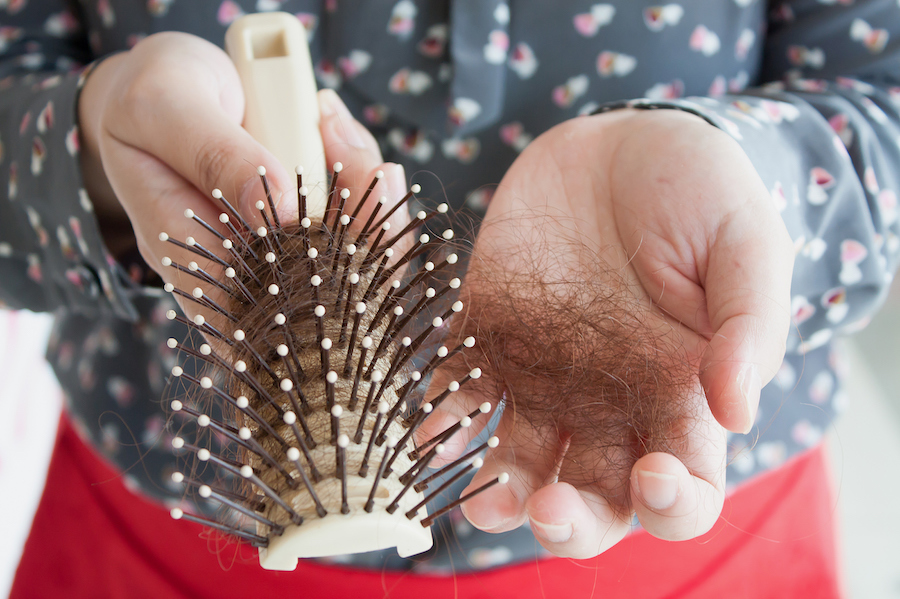Ask an expert: ‘Why is my hair suddenly falling out?’
We wash it, condition it, mousse, wax and style it – so it’s safe to say we get pretty attached to our hair. It’s no surprise, then, that clogging your shower’s plughole in the morning can be more than just an inconvenience – it’s also pretty worrying to see yourself shedding your luscious locks.
We lose hair all the time – around 100 strands on a daily basis – but if you’ve noticed yours falling out at an unusually high rate, don’t panic. Hair loss affects around three-quarters of men and a quarter of women at some point in their life, but losing hair doesn’t mean you’re going bald.
In fact, there are a number of factors that can bring about hair loss, from the vitamins you’re skipping to the hours you’re working. So what’s the best way to halt hair loss in its tracks? We asked the experts to weigh in.
Why does hair loss happen?
“There are a number of reasons for hair loss,” says Dr Kim Glass, lead GP at Bupa Health Clinics. “It’s not uncommon for your hair to thin with age. Although you can’t stop it, you can delay the process by maintaining a healthy diet and having a health check to make sure there are no underlying causes for your hair loss. If you’re worried about it relating to your physical or mental health, speak to your GP.
“Low iron and low thyroid levels can also cause your hair to become thinner and fall out more than usual. A blood test will identify if you have low iron or thyroid levels, and both of these can be increased through taking tablets. The hair loss should recover completely, although this may take a few months.
“Stress may contribute to loss, too. This temporary hair loss is called telogen effluvium, and can also be caused by some medicines and pregnancy. The best cure for this is identifying the trigger and finding ways to overcome it. For example, if you’re stressed, try finding a way to relax through exercise or meditation.
“Alopecia areata is a condition that causes patchy hair loss on the scalp. It’s caused by a problem with your immune system, which leads to inflammation affecting the hair follicles. It can be an unpredictable condition that’s difficult to treat, but fortunately, many people can expect their hair to grow back within a year. Your GP may suggest a referral to a dermatologist, who will discuss your treatment options with you.
“The most common form of alopecia in women is female pattern hair loss, also known as androgenetic alopecia. It’s a genetic condition and people with it will notice hair loss on the top of their heads. It usually occurs in your fifties or sixties, much like male pattern hair loss in men. If you have female pattern hair loss your GP may suggest you try a minoxidil 5% solution, which is a topical lotion or foam that’s available over the counter. It’s not guaranteed, but it can promote regrowth, at least in the short term for some women. If this doesn’t work, you may be referred to a dermatologist for further tests.
“Look out for inflammatory scalp conditions; skin conditions such as psoriasis, eczema or an infection can cause your hair to fall out. Often this can be treated, however, if the condition is severe, it may kill your hair follicles resulting in permanent hair loss. There are a few treatments that can be tried, such as topical corticosteroid creams or steroid injections, but the earlier you can see a doctor, the better.
“Finally, using straightening chemicals and hot combs can damage your hair. It sounds like a simple thing, but also avoid wearing your hair too tight, as you may be pulling out some of your hairs.”
What changes in diet and lifestyle can reduce hair loss?
“It’s important to note that many cases of hair loss are hereditary, and so are occurring naturally and can’t be stopped – it’s just genetics,” says Dr Kav Patel, online doctor at Push Doctor. “However, hair loss can sometimes be triggered by lifestyle factors.
“A poor diet can be a contributing factor, leaving you lacking the necessary vitamins and minerals (such as iron) needed to secure your hair’s long-term health. Hair products and treatments can also cause damage, from certain shampoos and conditioners to salon treatments and the way you style your hair.
“Smoking causes damage all over your body and your hair is no exception. Quitting this habit could also help your hair health.”
What treatments are available and what are the most effective?
“In cases of hereditary hair loss, sadly prevention isn’t an option as it’s completely natural,” says Dr Patel. “The treatment here will either involve paying for a hair transplant or hairpiece which can be expensive, or counselling to help you come to terms with the loss of your hair.
“If you’re suffering from alopecia, a doctor can suggest various treatment such as steroids, immunotherapy or light treatment to encourage growth, but they aren’t without side-effects. However, it’s important to remember that your hair loss may only be temporary and so might come back without any treatment being required at all.”
The Press Association
Latest posts by The Press Association (see all)
- Maple Cinnamon Granola - January 8, 2025
- 8 things your feet can tell you about your health - January 8, 2025
- 9 ways to look after your emotional health better in 2025 - January 7, 2025
- EastEnders fans to vote on storyline for the first time in 40th anniversary week - January 7, 2025
- Aldi beats rival Lidl as cheapest supermarket of 2024 - January 6, 2025





















